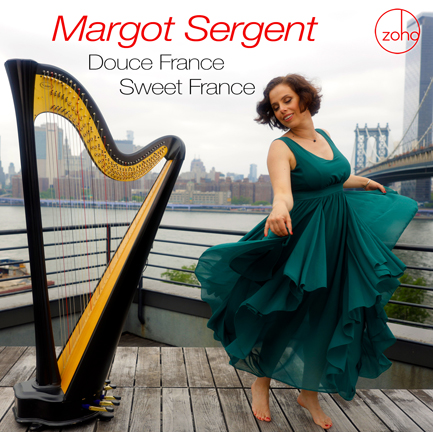|
Margot Sergent
Douce France Sweet France
CD Release Date: December 8, 2023
UPC Code: 880956230825
Availability: Worldwide
Selection #: ZM ZM 202308
Songs:
1. KEEP THE MOON IN MIND 3:54
Margot Sergent
2. DOUCE FRANCE 3:31
Charles Trenet
3. THE APARTMENT NEXT DOOR 4:58
Margot Sergent
4. I WISH YOU LOVE 4:33
Charles Trenet, Albert Beach
5. LITTLE MIRACLE 3:24
Margot Sergent
6. LA BOHÈME 4:01
Charles Aznavour
7. DANS TES BRAS MON ANGE 4:00
Margot Sergent
8. LA RUA MADUREIRA 3:36
Nino Ferrer
9. SILENT STEPS 3:01
Margot Sergent
10. L’HYMNE À L’AMOUR 4:42
Marguerite Monnot, Edith Piaf
11. SAUDADE 2:53
Margot Sergent
|
_
_
_
Musicians:
Margot Sergent - voice, harp
Patrick Brennan - guitar (1 -10)
Alec Safy - bass (1 -5, 7 - 10)
Linus Wyrsch - clarinet (2, 3, 8 - 10)
Ben Silashi - drums (5)
Vitor Goncalves - accordion (4, 6)
|
 |
|
A new singer. With some new songs—and some familiar ones as well. A relatively new instrument for a jazz vocalist. And what is for me, essentially, a new language—I mean, I barely speak English, let alone French.
This is what I thought I would be concentrating on as I listened to Margot Sergent. To my surprise, I had an entirely different experience from the one that I was anticipating.
Instead of thinking about the external forces shaping the music—some of which were highly notable, i.e., a bilingual French-born jazz singer who doubles on harp—I kept being drawn into the stories of the songs themselves.
The one that really grabbed me was the third track, The Apartment Next Door.I hadn’t yet absorbed Margot’s account of the writing of that song, so I found myself coming up with my own. As Margot tells it, it’s about when a new neighbor moved into said apartment next door, who, over time, became her best friend--“a soul sister,” as she puts it—who arrived in her life “exactly at the time I needed her the most, right next door.” Margot further explains that “the song is to celebrate all chosen family members” and she’s using that term to describe friends who become so close that they, in effect, become your new family, adding “and being grateful life will provide exactly what we need, in the most simple way.”
That was Margot’s take on her own song, but my listening experience was different: When she started singing, “Where will it be, your place or mine? The apartment next door,” I couldn’t help but start ruminating on the entire prospect of life in apartments. I was practically born in a New York apartment, and I have lived my whole life thus far in one.
The song inspired me to reflect on growing up, growing older, being single, being married, being divorced—rinse and repeat—growing and living a vital and full life, all within the confines of a Manhattan one bedroom. She set the melody in 3/4 time, which serves as a signifier to me of the cyclic nature of life. The clarinet solo by Linus Wyrsch reinforces that notion, illustrating musically how existence is rarely about beginnings or endings but more usually fits into a circular pattern.
In one song after another, Margot Sergent tells a story and makes it ours as well as hers. Keep the Moon In Mind, she tells us, is about several things at once: traveling through the desert with a female companion who favored “high heels” and “silky dresses,” which seemed very much out of place on that particular landscape. As they cross the dunes, they speak of life and observe the stars—which are abundantly overwhelming at night in the desert—and discuss them both scientifically and philosophically as vehicles of the imagination (“Always wishing on a shooting star/Unreachable, untouchable”).
Mademoiselle Sergent’s ensemble is unique in the annals of French, American, or any other kind of jazz; the overall group sound is light and floating, as if suspended in midair and not tethered to the ground in any palpable way, but nonetheless swinging. As the pivot point of the group, her harp sounds like a guitar and a piano both at the same time, as the primary melodic and harmonic, not to mention rhythmic nexus. She is almost a one-woman show, especially on the many songs that she wrote here.
When we hear the accordion we tend to think of traditional French Bal-Musette ensembles. We hear two guitars and we think of the Quintette of the Hot Club of France jazz manouche sound pioneered by Django Reinhardt and Stéphane Grappelli, but, we remember that our ears are deceiving us, since there isn’t a second guitar but rather Margot’s harp taking the place of one. Those tracks with Mr. Wyrsch remind us of the 1940s edition of the QHCF with clarinetist Hubert Rostaing replacing Grappelli in the front line.
Margot has created a group sound that perfectly suits her translucent, airy, beautiful soprano voice and her lightly swinging style as both singer and instrumentalist; the group is light and yet profound at the same time. It’s especially impressive in the way that they take some of the heavier French songs, like Edith Piaf’s L’Hymne à l’Amour which is normally performed as a big dramatic belt number (even in English as “If You Love Me”) and Charles Aznavour’s La Bohème, traditionally rendered as a rather somber waltz. Nino Ferrer’s La Rua Madureira, which is essentially a duo between Margot and guitarist Patrick Brennan, likewise could be a dark tale about a tragic incident by a composer who also died tragically. Yet Margot and company take all of these songs and make them lighter without compromising any of their dramatic power.
Margot also underscores why Charles Trenet is my favorite French songwriter. Only Trenet could write a love song to his native country - Douce France” - and have it not sound like a dreary anthem. Likewise only Trenet could write a bittersweet song of farewell and have it be more optimistic rather than
|

despondent; loving, forgiving, and compassionate rather than accusatory. Margot brings out and enhances all these qualities in Trenet’s music and words, particularly in her dual-language reading of Que reste-t-il de nos amours? (“I Wish You Love”).
Of Margot’s other originals, “Dans Tes Bras Mon Ange,” is a yearning, probing ballad that, she explains, is about the transformative power of love, how it creates a safe space and can heal all wounds. Silent Steps is a jubilant, cautiously upbeat number, which stresses Patrick Brennan’s guitar and Alec Safy’s bass, for “celebrating little achievements, victories that make us feel successful, whatever that means to us.” Little Miracle incorporates a suggestion of African rhythmic patterns and was inspired by a jazz griot from the Republic of Guinea; it’s about finding the magical in the everyday. The album ends with a touching original, the Brazilian-inspired Saudade, a solo for harp that, as the Portuguese title infers, is both happy and sad at the same time.
That’s what superior storytellers do—they take hold of your imagination and guide you through their stories. But soon enough, it isn’t about them, it’s about you; they’re like spirit guides who help you to find yourself in their narratives. It isn’t about the words or the notes but the feelings that they inspire. – Will Friedwald
Sincere thanks to my incredible musicians on this album, who are not only among the most talented on this planet, but also among the kindest people I know. Thank you Eva Gertz, Anna Talpe, Jacob Carr, Gaya Feldheim Schorr, Will Silvio, Kathleen Flynn, Ed Tomassi, Maggie Scott, and Mark Simos for sharing your passion and dedication to music in such an inspiring and uncompromising way. To Daniel Bloch and Dave Darlington, Bunker Studio, and Hook & Fade Studios: thank you for your professionalism and kindness to the entire team. To Stephen Hanks and Gianni Valenti: your guidance has changed my life since the moment we met. To Will Friedwald for really hearing my music and for his insightful and passionate words.
This album is dedicated to my mother Françoise Sergent, my husband Ricardo Corassa, my nieces Angeline and Clemence, their mother, Virginie, Anne Filhol, my uncle Bud Kappler, Caroline and David M., Antoine Larcher, Flora Vannineuse, Nicolas Gauffreteau.To all my beloved Patreons (especially Nicole and George Henry Le R. Deric E. , Charles B.) and all the GoFundMe contributors who made the master production and album release possible. And to those the songs were inspired by, including Ricardo R., Jessica Z., and Carole S." -- Margot Sergent
Produced by Margot Sergent. Associate Producer: Stephen Hanks. Musical producer: Tal Yahalom. Arrangers: Tal Yahalom (1, 5, 7, 9); Freddie Bryant (3);
Margot Sergent, Tal Yahalom (2, 4, 6, 8, 10). Sound Engineer: Daniel Bloch, Aaron Nevezie. Mixing and Mastering.: Daniel Bloch, David Darlington. Recorded at The Bunker Studio, Brooklyn, NY, and Hook and Fade Studios, Brooklyn, NY, in November 2022 and January 2023. Photography: Alan Bresson. Art direction and package design: Al Gold. Executive Producer: Joachim “Jochen” Becker.
|
|
|
|

